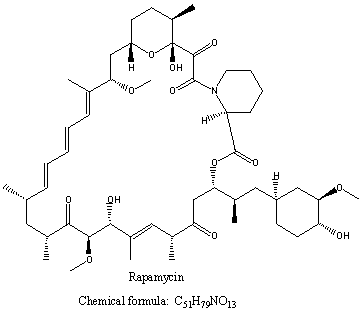|
|
|
Rapamycin (also called sirolimus) is a peptide that was isolated in 19751from the bacteria strain Streptomyces hygroscopicus found in a soil sample on Easter Island.
It has the structure shown below.

Rapamycin has been found to have a number of interesting properties, including a novel mechanism of immunosuppression. There is therefore a lot of interest in its use as a drug to prevent rejection of organ transplants. Its different mode of action to immunosupressants currently used means there is great hope for its potential uses and advantages over other treatments.
The general shortage of organs for transplants mean that any drug that increases the chance of organ survival is greatly needed. Treatments conventionally used, such as cyclosporin and FK506 are effective in ensuring the short-term survival of the transplant, but ultimately the organ is still rejected in the long term. Rapamycin could be very important in the treatment of organ transplant patients as it appears to have a different mechanism of action to cyclosporin and FK506. Because of this it is said to be in a new class of immunosuppressant agents. It also appears to cause fewer side effects than the standard anti-rejection treatments due to its novel mode of action.
The cytotoxic properties of rapamycin could also make it effective in the treatment of cancer and there is ongoing research in this area.
Rapamycin is now marketed under the tradename 'Rapamune' by Wyeth-Ayerst (part of American Home Products). It recieved marketing approval as an immunosuppressant from the U.S. Food and Drug Administation (FDA) in September 1999.
penitrem | puromycin | radicicol | rapamycin | sterigmatocystin | tunicamycin | verruculogen | aborto | ispartatuning | gaysask | linkonewbies | tv1 | correntinos